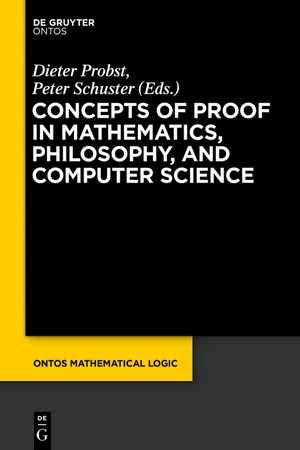
Concepts of Proof in Mathematics, Philosophy, and Computer Science
Dieter Probst, Peter Schuster, Dieter Probst, Peter Schuster
- 384 Seiten
- English
- ePUB (handyfreundlich)
- Über iOS und Android verfügbar
Concepts of Proof in Mathematics, Philosophy, and Computer Science
Dieter Probst, Peter Schuster, Dieter Probst, Peter Schuster
Über dieses Buch
A proof is a successful demonstration that a conclusion necessarily follows by logical reasoning from axioms which are considered evident for the given context and agreed upon by the community. It is this concept that sets mathematics apart from other disciplines and distinguishes it as the prototype of a deductive science. Proofs thus are utterly relevant for research, teaching and communication in mathematics and of particular interest for the philosophy of mathematics. In computer science, moreover, proofs have proved to be a rich source for already certified algorithms.
This book provides the reader with a collection of articles covering relevant current research topics circled around the concept 'proof'. It tries to give due consideration to the depth and breadth of the subject by discussing its philosophical and methodological aspects, addressing foundational issues induced by Hilbert's Programme and the benefits of the arising formal notions of proof, without neglecting reasoning in natural language proofs and applications in computer science such as program extraction.
Häufig gestellte Fragen
Information
Theories of Proof-Theoretic Strength ψ(ΓΩ+1)


1Introduction

Inhaltsverzeichnis
- Cover
- Title Page
- Copyright
- Preface
- Contents
- Introduction
- Herbrand Confluence for First-Order Proofs with Π2-Cuts
- Proof-Oriented Categorical Semantics
- Logic for Gray-code Computation
- The Continuum Hypothesis Implies Excluded Middle
- Theories of Proof-Theoretic Strength ψ(ΓΩ+1)
- Some Remarks about Normal Rings
- On Sets of Premises
- Non-Deterministic Inductive Definitions and Fullness
- Cyclic Proofs for Linear Temporal Logic
- Craig Interpolation via Hypersequents
- A General View on Normal Form Theorems for Łukasiewicz Logic with Product
- Relating Quotient Completions via Categorical Logic
- Some Historical, Philosophical and Methodological Remarks on Proof in Mathematics
- Cut Elimination in Sequent Calculi with Implicit Contraction, with a Conjecture on the Origin of Gentzen’s Altitude Line Construction
- Hilbert’s Programme and Ordinal Analysis
- Aristotle’s Deductive Logic: a Proof-Theoretical Study
- Remarks on Barr’s Theorem: Proofs in Geometric Theories
- Endnotes